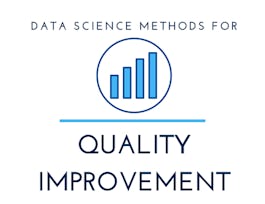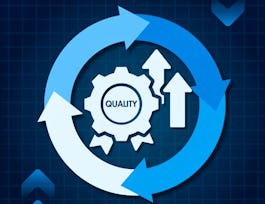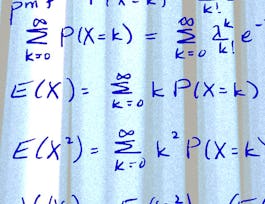In diesem Kurs lernen Sie, Daten im Hinblick auf Prozessstabilität und statistische Kontrolle zu analysieren und warum ein stabiler Prozess unerlässlich ist, bevor Sie statistische Hypothesentests durchführen. Sie erstellen statistische Prozessregelkarten für kontinuierliche und diskrete Daten mit der Software R. Sie werden Datensätze für die statistische Kontrolle mit Hilfe von Kontrollregeln auf der Basis von Wahrscheinlichkeiten analysieren. Darüber hinaus lernen Sie, wie Sie einen Prozess im Hinblick auf die Erfüllung interner oder externer Spezifikationen bewerten und Entscheidungen zur Prozessverbesserung treffen können. Dieser Kurs kann als Teil des Master of Science in Data Science (MS-DS) der CU Boulder auf der Coursera-Plattform absolviert werden. Der MS-DS ist ein interdisziplinärer Studiengang, der Lehrkräfte aus den Fachbereichen Angewandte Mathematik, Informatik, Informationswissenschaften und anderen Bereichen der CU Boulder zusammenbringt. Da die Zulassung leistungsabhängig ist und es kein Bewerbungsverfahren gibt, ist der MS-DS ideal für Personen mit einem breiten Spektrum an grundständiger Ausbildung und/oder Berufserfahrung in Informatik, Informationswissenschaft, Mathematik und Statistik. Erfahren Sie mehr über das MS-DS-Programm unter https://www.coursera.org/degrees/master-of-science-data-science-boulder.



Stabilität und Fähigkeit zur Qualitätsverbesserung
Dieser Kurs ist Teil von Spezialisierung Datenwissenschaftliche Methoden zur Qualitätsverbesserung

Dozent: Wendy Martin
1.830 bereits angemeldet
Bei  enthalten
enthalten
(12 Bewertungen)
Empfohlene Erfahrung
Was Sie lernen werden
Verstehen, wie man Prozessregelkarten verwendet, auswählt und interpretiert, um spezielle Ursachen für Abweichungen zu identifizieren
Erstellen und Interpretieren von Kontrollkarten für normale und nicht-normale Verteilungen
Erstellen und interpretieren Sie Regelkarten für diskrete Daten
Analysieren Sie die Fähigkeit eines Prozesses, die Kundenspezifikationen zu erfüllen
Kompetenzen, die Sie erwerben
- Kategorie: Treffen Sie Entscheidungen zur Prozessverbesserung
- Kategorie: Analysieren eines Prozesses auf Stabilität
- Kategorie: R-Programmierung
- Kategorie: Rstudio
- Kategorie: Analysieren eines Prozesses auf seine Fähigkeit
Wichtige Details

Zu Ihrem LinkedIn-Profil hinzufügen
5 Quizzes
Erfahren Sie, wie Mitarbeiter führender Unternehmen gefragte Kompetenzen erwerben.

Erweitern Sie Ihre Fachkenntnisse
- Lernen Sie neue Konzepte von Branchenexperten
- Gewinnen Sie ein Grundverständnis bestimmter Themen oder Tools
- Erwerben Sie berufsrelevante Kompetenzen durch praktische Projekte
- Erwerben Sie ein Berufszertifikat zur Vorlage


Erwerben Sie ein Karrierezertifikat.
Fügen Sie diese Qualifikation zur Ihrem LinkedIn-Profil oder Ihrem Lebenslauf hinzu.
Teilen Sie es in den sozialen Medien und in Ihrer Leistungsbeurteilung.

In diesem Kurs gibt es 5 Module
In diesem Modul lernen Sie, wie Sie einen Prozess definieren und ihn in seine Komponenten zerlegen, um potenzielle Abweichungsquellen zu identifizieren. Sie lernen, wie Sie mit Hilfe einer Regelkarte Abweichungen in allgemeine und spezielle Ursachen einteilen können. Sie lernen die Taguchi-Verlustfunktion kennen und erfahren, wie sie mit der Qualitätsphilosophie und den Zyklen der Produkt- und Prozesskontrolle zusammenhängt. Sie lernen die grundlegende Anatomie einer Regelkarte sowie den Prozess zur Erstellung einer Regelkarte und häufige Fehler, die bei der Verwendung einer Regelkarte in der Praxis auftreten. Sie werden in der Lage sein, einen angemessenen Stichprobenumfang zu berechnen und auf der Grundlage statistischer Regeln zu bestimmen, wann ein Prozess unter Kontrolle ist oder außer Kontrolle gerät.
Das ist alles enthalten
13 Videos2 Lektüren1 Quiz2 Diskussionsthemen
In diesem Modul lernen Sie, wie Sie anhand von Informationen über den Stichprobenumfang und den Datentyp die geeignete Karte auswählen. Sie lernen, wie Sie Kontrolldiagramme mit Untergruppen für Variablendaten erstellen und interpretieren und wie Sie diese in R erstellen können. Sie werden auch Kontrolldiagramme mit einer Stichprobengröße von einem normalverteilten Datenwert erstellen und interpretieren. Sie werden lernen, wie Sie andere Statistiken mit Hilfe des Individuals und des Moving Range Charts überwachen können. Schließlich werden Sie die Kontrollkarten für die statistische Kontrolle/Stabilität interpretieren.
Das ist alles enthalten
11 Videos1 Quiz1 Diskussionsthema
In diesem Modul lernen Sie, wie Sie ein X- und ein Moving Range Chart erstellen, wenn die zugrunde liegende Verteilung nicht normalverteilt ist. Sie lernen, wie Sie Kontrollgrenzen für die X- und MR-Charts mit LogNormal-transformierter Verteilung und Exponentialverteilung berechnen können. Außerdem lernen Sie, wie Sie eine Verteilung an die Daten anpassen und die Kontrollgrenzen für die ausgewählte Verteilung berechnen können. Schließlich werden Sie die Kontrollkarten für die statistische Kontrolle/Stabilität interpretieren.
Das ist alles enthalten
12 Videos1 Quiz1 Diskussionsthema
In diesem Modul lernen Sie, wie Sie Prozessvariationen mit Kundenspezifikationen vergleichen können. Sie lernen die drei Indizes kennen, die mit Fähigkeitsmessungen und die drei Indizes, die mit Leistungsmessungen verbunden sind. Außerdem lernen Sie, wie Sie die Fähigkeit und Leistung bewerten, wenn die Daten nicht normal verteilt sind.
Das ist alles enthalten
16 Videos1 Quiz1 Diskussionsthema
In diesem Modul lernen Sie, wie Sie Regelkarten für diskrete Daten erstellen und analysieren können. Sie lernen, wie Sie zwischen binomial- und poissonverteilten Daten unterscheiden können, um die passende Regelkarte auszuwählen. Außerdem lernen Sie, wie Sie die Leistungsfähigkeit mit Hilfe eines geeigneten diskreten Wahrscheinlichkeitsmodells bewerten können.
Das ist alles enthalten
12 Videos1 Quiz1 Diskussionsthema
Dozent

Empfohlen, wenn Sie sich für Wahrscheinlichkeitsrechnung und Statistik interessieren

University of Colorado Boulder

University of Colorado Boulder

Board Infinity

University of Colorado Boulder
Auf einen Abschluss hinarbeiten
Dieses Kurs ist Teil des/der folgenden Studiengangs/Studiengänge, die von University of Colorado Boulderangeboten werden. Wenn Sie zugelassen werden und sich immatrikulieren, können Ihre abgeschlossenen Kurse auf Ihren Studienabschluss angerechnet werden und Ihre Fortschritte können mit Ihnen übertragen werden.¹
Warum entscheiden sich Menschen für Coursera für ihre Karriere?





Neue Karrieremöglichkeiten mit Coursera Plus
Unbegrenzter Zugang zu 10,000+ Weltklasse-Kursen, praktischen Projekten und berufsqualifizierenden Zertifikatsprogrammen - alles in Ihrem Abonnement enthalten
Bringen Sie Ihre Karriere mit einem Online-Abschluss voran.
Erwerben Sie einen Abschluss von erstklassigen Universitäten – 100 % online
Schließen Sie sich mehr als 3.400 Unternehmen in aller Welt an, die sich für Coursera for Business entschieden haben.
Schulen Sie Ihre Mitarbeiter*innen, um sich in der digitalen Wirtschaft zu behaupten.
Häufig gestellte Fragen
Der Zugang zu Vorlesungen und Aufgaben hängt von der Art Ihrer Einschreibung ab. Wenn Sie einen Kurs im Prüfungsmodus belegen, können Sie die meisten Kursmaterialien kostenlos einsehen. Um auf benotete Aufgaben zuzugreifen und ein Zertifikat zu erwerben, müssen Sie die Zertifikatserfahrung während oder nach Ihrer Prüfung erwerben. Wenn Sie die Prüfungsoption nicht sehen:
Der Kurs bietet möglicherweise keine Prüfungsoption. Sie können stattdessen eine kostenlose Testversion ausprobieren oder finanzielle Unterstützung beantragen.
Der Kurs bietet möglicherweise stattdessen die Option 'Vollständiger Kurs, kein Zertifikat'. Mit dieser Option können Sie alle Kursmaterialien einsehen, die erforderlichen Bewertungen abgeben und eine Abschlussnote erhalten. Dies bedeutet auch, dass Sie kein Zertifikat erwerben können.
Wenn Sie sich für den Kurs einschreiben, erhalten Sie Zugang zu allen Kursen der Specializations, und Sie erhalten ein Zertifikat, wenn Sie die Arbeit abgeschlossen haben. Ihr elektronisches Zertifikat wird Ihrer Erfolgsseite hinzugefügt - von dort aus können Sie Ihr Zertifikat ausdrucken oder zu Ihrem LinkedIn-Profil hinzufügen. Wenn Sie die Kursinhalte nur lesen und ansehen möchten, können Sie den Kurs kostenlos besuchen.
Wenn Sie ein Abonnement abgeschlossen haben, erhalten Sie eine kostenlose 7-tägige Testphase, in der Sie kostenlos kündigen können. Danach gewähren wir keine Rückerstattung, aber Sie können Ihr Abonnement jederzeit kündigen. Siehe unsere vollständigen Rückerstattungsbedingungen.

